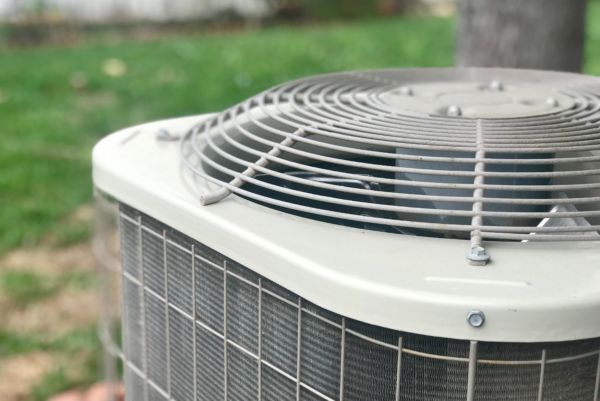What Kind of Coolants Are Used in Air Conditioners?
July 25, 2023

When you run your AC unit on a blistering hot day, you likely don't pay much attention to the inner workings of this system. However, numerous parts work together to keep your unit running smoothly with every use.
One of the most vital components of your air conditioner is a fluid known as coolant. Also referred to as refrigerant, AC coolant is a substance used to regulate the temperature of airflow from your AC system. As refrigerant expands or vaporizes, it has a cooling effect on the air that flows out of the vents.
Familiarizing yourself with the different forms of coolant can help you make informed decisions regarding AC maintenance, repairs, and replacements. So, to breakdown this complex topic into relatable terms, let’s explore:
- HVAC coolant vs. auto coolant
- History of coolants in HVAC systems
- The phase out of R-22 for modern ACs
Have AC coolant questions? Speak with Advanced Air’s experts.
Proudly serving Fort-Myers, Florida homeowners for more than 30 years, our experienced pros have expert answers to all of your AC related questions. Call us today at (888) 853-5143 or click the button below to schedule AC maintenance today.
HVAC Coolant Vs. Auto Coolant
While coolant is a term that refers to both AC units and car engines, there are key differences between these two substances. In an automobile, coolant is used to prevent the engine from overheating. Car engines produce high levels of heat, which can cause your vehicle's temperature gauge to reach dangerous temperatures. To stop this from happening, your car's cooling system circulates liquid engine coolant throughout the engine. The coolant then exits through the radiator, where it is cooled by the air escaping the front grill of the vehicle.
HVAC coolant serves a distinctly different purpose. Air conditioning coolant is a specialized substance used to remove heat from the air, resulting in cooler temperatures. It operates on the principle of phase change, transitioning between liquid and gas states to absorb and release heat energy.
In short, your AC system uses refrigerant to cool the interior of your home to maintain a comfortable temperature, while auto coolant is simply to stop the engine from overheating.
History of Coolants in HVAC Systems
There are three main coolants found in modern HVAC systems: chlorofluorocarbons (CFCs), hydrochlorofluorocarbons (HCFCs) and hydrofluorocarbons (HFCs). Each substance has a unique effect on cooling systems as well as the environment as a whole. We'll take a closer look at each type of coolant so you can better understand which one is best for your AC unit.
Chlorofluorocarbons (CFCs)
Chlorofluorocarbons, commonly known as CFCs, consist of carbon, chlorine and fluorine atoms. These organic compounds have been widely used in conventional cooling systems. However, emerging research has identified CFCs as ozone-depleting chemicals that can negatively impact the environment on a long-term basis. To combat the hazardous effects of CFCs, organizations like the Montreal Protocol have proposed initiatives to phase out these coolants entirely.
Hydrochlorofluorocarbons (HCFCs) or R-22
To minimize the need for CFCs in traditional HVAC systems, many manufacturers have switched to hydrochlorofluorocarbons, also known as HCFCs or R-22. These coolants are less stable than CFCs, which means they generally weaken before reaching the ozone layer. However, HCFCs are still capable of causing long-term damage to the ozone and harming human health as a result. The production of R-22 is therefore being phased out little by little to curb its harmful effects.
Hydrofluorocarbons (HFCs) or R-410A
Hydrofluorocarbons, or HFCs, are fluorinated gasses that consist of hydrogen, carbon and fluorine atoms. While these substances don't have the same ozone-depleting effect that CFCs do, they pose a unique problem to the environment. Scientists have discovered that HFCs trap heat, which can contribute to global warming in the long run. As a result, HFCs — which are commonly referred to as R-410A by experts — are being treated similarly to CFCs and HCFCs. Many eco-friendly organizations are taking steps to phase out the production of this coolant to promote more environmentally friendly AC systems.
To learn more, check out our blog, “R-410A vs. R-32 Refrigerant: Which is Better for My Florida Home?”
The Phase Out of R-22 for Modern ACs
Out of the three types of coolant, HCFCs or R-22 pose the most immediate concern for the well-being of the environment. Companies are therefore targeting these substances first when attempting to create more eco-friendly cooling systems. While many HCFCs have already been eliminated, R-22 is still commonly used for air conditioning, fire suppression and servicing refrigeration purposes.
According to the United States Environmental Protection Agency, a total HCFC phaseout is set to occur in 2030. In 2020, 99.5% of R-22 was already discontinued, and the production and import of HCFC-22 and HCFC-142b was halted. By 2030, no form of R-22 will be produced or imported in any way. The progress that HVAC manufacturers have made thus far shows promise for the future of HCFCs.
Have questions about what refrigerant is right for your home? Call Advanced Air’s HVAC experts.
Since 1989, our honest and professional technicians have been providing top-tier HVAC repairs, replacements, and maintenance to Fort Myers, FL homeowners and the surrounding area. When you work with us, you can expect no-surprise pricing and fast, convenient scheduling every time. And if you’re experiencing a breakdown, you can depend on us to get your system back up and running within 24 hours.
Call us today at (888) 853-5143 or click the button below to schedule an appointment online. We’re proud to be rated 5-stars by thousands of satisfied customers!
- Posted in:
- Air Conditioning

